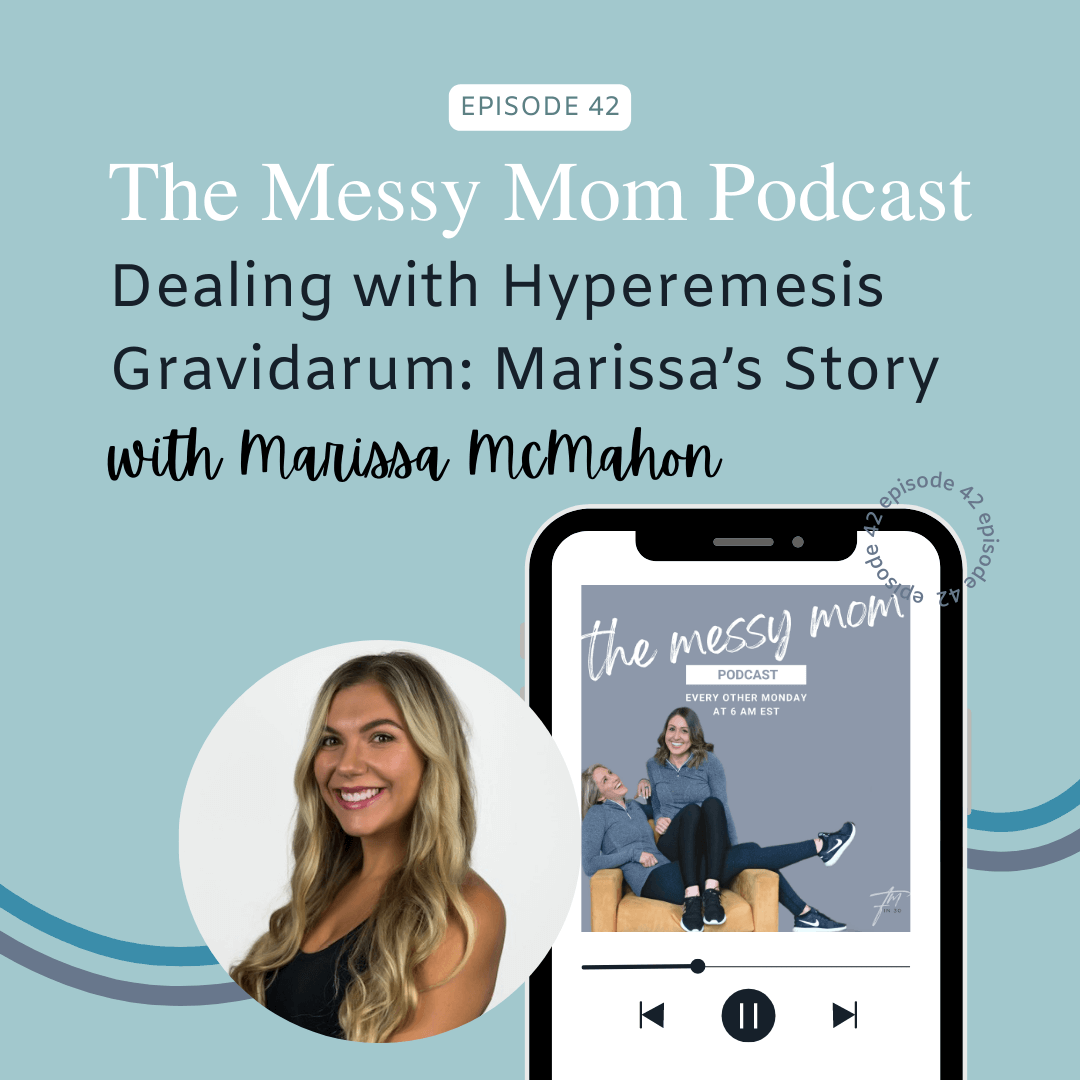CLICK PLAY TO LISTEN TO DEALING WITH HYPEREMESIS GRAVIDARUM: MARISSA’S STORY:
Dealing with Hyperemesis Gravidarum: Marissa’s Story
Today we are covering another topic that needs more awareness. We think it will be a helpful and eye-opening conversation for many mamas but especially ones dealing with nausea and vomiting while pregnant.
Our guest is Marissa McMahon. She is a wife, mother, and women’s health practitioner who grew up in Carmel, IN. She attended Indiana University for her undergrad and Vanderbilt University for her master’s. Now she keeps busy with her almost 2-year-old, Baker, and she is expecting identical twin boys this summer. You’ll read about her crazy story that brought us here today as she struggles with hyperemesis gravidarum.
Join us, in this episode, where we and Marissa talk about her own personal journey and challenges she faces while dealing with hyperemesis gravidarum, what it is, how how to treat it, why it happens, and more.
Marissa’s Story
With her first son, she had pretty bad nausea and vomiting but nothing like when she figured out she was pregnant this second time around. She couldn’t stomach anything and was so nauseous. At 3 weeks pregnant and with her medical knowledge background she was confused and thought, how can I be nauseous this early? So, she took a pregnancy test and it immediately flashed positive.
Fast forward a little bit when she’s on her first day back at work, 5 weeks pregnant, and throwing up constantly. She felt something was wrong with herself. So, she did an ultrasound with her ultrasound tech and there were 2 sacks. At the time, 1 had a very small fetus in it and the other had nothing. It was empty and she actually thought she had vanishing twin syndrome. This is very common, as Marissa explains, “It’s when 2 babies implant. But then only one of them makes it.”
As time goes on, nausea and vomiting are getting so severe she had to stop working completely. She couldn’t keep any food or drinks down, taking ivy fluid trips to the E.R. and finally, they did another ultrasound. And surprise, there were 2 real babies in there. And that was very shocking because 1 baby is hard and now there were 2, identical, Di-Di twins. Note this is very rare but Di-Di can be identical. They are in different sacks with their own placentas which means they split very early on. This is also probably why she got a very bright pregnancy test and felt those intense nausea symptoms so early.
What is Hyperemesis Gravidarum
Bailey jumps right in with the first question, asking Marissa to explain what hyperemesis is and how it’s different from someone who has what we’ll call morning sickness (even though we know that sickness can happen at any time of the day).
Marissa tells us, “hyperemesis in basic terms is severe nausea and vomiting in pregnancy which then causes other issues. Those other issues being dangers to mom and baby or babies dehydration, extreme weight loss, and starvation. And so it’s different from morning sickness in the severity of it. If you do not treat severe morning sickness appropriately and timely it can actually turn into hyperemesis.”
She also mentions a great website called hyperemesis.org, the leading researcher, and they go through the differences between them. As she explains, “the first thing is, with normal morning sickness you lose just a little bit of weight. A lot of people lose between 3 and 5 pounds they don’t have a huge appetite, they have major food diversions, and carbs are the only thing that sounds good. What most people think of when they think of typical morning sickness.”
She continues, “with hyperemesis It’s typically considered with most doctors losing at least 5% of your body weight but some you might do 10%. So, I started out at 125 pounds and was down to 115 pounds in a week and a half period. I was literally starving in my own home. I could not keep my food and water down. I remember sending Bailey a video when I was like five weeks, taking a drink of water and it just would immediately come back up. It’s so mentally and physically exhausting to try to eat, everything just comes back up. Try to drink, everything comes back up. When you are trying to keep alive these babies in your stomach and yourself. So that’s a huge major difference. It also is basically how much the nausea and vomiting interferes with your daily life. So, with some bad nausea and vomiting in pregnancy, you can go on. With my first son, I still worked, I still taught Pure Barre, and I lived a normal life even though it was really hard. With this, I did not leave the couch for I think five weeks total other than to go to the E.R. and the hospital. I was able to start getting up once I got my medication regimen fixed. Then it’s also how much you’re vomiting, a couple of vomits a day is very normal with pregnancy. I was vomiting on bad days upwards of 40 times a day. It’s just nonstop. Headaches and migraines are also major symptoms.”
It can be very isolating. At some points, she would have to sit in a dark room, with no lights, tv, or phone. Unfortunately, traditional measures like medications and eating small infrequent meals that will help nausea and vomiting, do not help hyperemesis. You have to get on the correct regimen for yourself. It takes working with doctors and figuring out what that is. And that was probably the most frustrating part for her, as everyone in her life was trying to help with “have you tried…” but that just doesn’t cut it.
Not only she, but her mom likely experienced it when she was pregnant. As it is hereditary, there is a gene that puts you at risk for it. But it’s very underdiagnosed and she was never diagnosed. Her mom describes hyperemesis as the stomach flu every day for six months.
Something to mention, even for Marissa, someone educated and in the medical industry, it was challenging to get treatment and a diagnosis for it. This included talking on the phone every day for weeks with the triage nurse trying to get through to a doctor and going to the ER all the time for fluids. She was like I need a new plan and finally, a physician at her practice helped her work out the correct drug regimen at around 12 weeks. She was able to keep food down and be a somewhat active part of her son’s life again!
How to Treat Hyperemesis
And that question bridged excellently into our next question from Cari, how do you treat hyperemesis?
And Marissa explains, “there are a lot of medications out there. The one thing that’s important to know about treatment for hyperemesis is that they all treat vomiting rather than nausea. So, you still feel sick and have that nauseous brain fog all the time even with taking these medications. But the first line of medication is over-the-counter Unisom and B6. That’s typically the first thing that doctors will prescribe if you’re having nausea and vomiting along with dietary changes. So, once that fails you kind of move through the different nausea medications. Which some of them have studies that show risks, which was really difficult thing for me to kind of know that there were risks to my babies but I needed to do this to survive and to live. So, with Baker you know I was like I don’t want to take Zofran, I don’t want to take Promethazine, I don’t want to take some of these more second, third line nausea medications because of the risks. But this time the risk of starvation and organ failure was too intense to not take these medications. Luckily, I’ve had my anatomy scan everything looks perfect on both boys so it was worth it. And then a huge part of treatment is also fluids and potentially a feeding tube.”
She herself was getting fluids 1 to 2 times a week because of severe dehydration with it. It was incredible for her because she didn’t have to then worry about trying to take sips of a drink and throwing it all back up. It was the biggest relief that it was going in her body and she didn’t have to do anything.
So, fluids and dehydration are a huge part of it. You have to be hydrated for that nausea and vomiting cycle to get under control. And remember, it’s different for every single person. What might work for one person, might not work for another.
The medication that finally ended up helping Marissa is called Reglan, it treats Gastroparesis, which is the slowing down of the Gi tract. So, it helped speed up her Gi tract and it treats hyperemesis as well. That’s what finally made the difference for her.
Why Hyperemesis Happens
Bailey wanted to know more about why hyperemesis happens as Marissa had mentioned the gene that makes this prominent. She asks, “do they know why hyperemesis happens for some people and other people not? Is it specifically that gene or can there be other factors?”
Yes, if your mom got it, it is hereditary if you have a female fetus and if you have multiples (like Marissa and her twins).
Marissa continues, “this gene is the first gene that’s been found that we really know this condition exists. It’s huge in the hyperemesis research field right now, it was actually just on the cover of the New York Times 2 weeks ago. Which is huge. The leading doctor that found this gene her name’s Dr. Marlena Fejzo, she had hyperemesis with her second and she actually lost the baby because of starvation and heart failure. But she made it her life’s mission to figure out this work because so many doctors dismiss women when they come in with these concerns. She’s still working on getting the exact genes and exactly what’s going on but the gene that they found is also what causes nausea and vomiting in cancer patients. And we think of being very severe as well. So it’s a similar sort of feeling from what I’ve gathered.”
And Marissa herself as we mentioned really had to advocate for herself what she was experiencing. She had one doctor tell her, “It’ll be better with twins by fourteen weeks” and she had to remind him, “I was like okay by fourteen weeks if you don’t treat me I will be dead so we need to do better here.”
But she was lucky she had the medical background she did and that she had a village around her, including her husband and her mom to help support her during this time. And the fact that she can lie down and rest, which is a big part of hyperemesis, and making sure you are able to function is important. The only silver lining here other than that is getting her babies out.
Another thing to note, Marissa is also part of a support group. She highly recommends it to anyone that goes through this, or even severe nausea and vomiting because it can be so miserable during pregnancy. Joining the support group was huge because there are very few people in the world (3-5% of pregnancies, and this is probably higher) that have experienced this.
Marissa’s Advice for Getting Through Hyperemesis Gravidarum
This led us right to our next question for Marissa on how isolating this can feel when dealing with hyperemesis gravidarum. How else has she gotten through this? What is her advice to people to stay positive and get through this?
Marissa mentions that she has worked with a therapist to deal with this depressing and isolating time. Another thing is knowing you have that support group is big. Her family and friends have been great about it.
If you can bring someone dinner or grab something that sounds good to them at the grocery store, that can be an extremely helpful thing for someone dealing with hyperemesis. Little things like that can get you through each day.
She reminds us that positivity can be hard during this time. And that’s why the support group can be helpful. For Marissa, they reminded her it’s okay to be a “negative Nancy” during this because it’s the hardest thing she’s ever done. It’s about surviving one day at a time.
And once you give birth nausea can go away right away. But remember, this will be different for every patient. For Marissa, during her first pregnancy, she experienced uncontrollable vomiting during active labor and once he was out, she felt instantly better. So, remember you are working towards a very happy ending.
Bringing More Awareness to Hyperemesis
On the flip side of things, something we talk about often is how pregnancy and postpartum don’t get talked about enough. So, Cari was curious about what Marissa thinks needs to happen to bring more awareness to hyperemesis.
For her, the fact that the New York Times article was on the front page was huge. She hopes that every OBGYN in the US and internationally reads that and feels bad for dismissing a lot of females’ concerns with nausea and vomiting because the awareness is not there right now.
These women are suffering in silence, at home starving, having frequent E.R. visits, and until they find a doctor that is really educated in hyperemesis, they’re not going to get the proper treatment.
So, she thinks we need more awareness with journal articles and studies to show doctors that women need help. People are miserable during pregnancy and it’s just not treated as it should.
Hyperemesis Gravidarum is Not Talked About Enough
Hyperemesis is not talked about enough and we are so thankful for Marissa coming onto the Messy Mom Podcast, especially during this challenging time, sharing her story, and being vulnerable to help others dealing with this.
In the end, Bailey points out that Marissa said to her, the stomach flu doesn’t compare to hyperemesis. And she agreed because with the stomach flu, you get that relief after and there’s no relief with hyperemesis. It’s just the consistent, persistent nausea.
We hope you learned something new, if you have any questions about this topic please don’t hesitate to ask.
This is only the beginning of our conversation on dealing with hyperemesis gravidarum: Marissa’s story with Marissa McMahon. Listen to the full episode wherever you listen to your podcasts.
Resources mentioned:
- www.hyperemesis.org
- The New York Times Article on hyperemesis gravidarum
- Find us over on Instagram @fitmamain30
- Try any of our Fit Mama in 30 programs completely free for seven days. And if you decide you want to stick with us after the seven days, you can get $10 off your membership with the code PODCAST at checkout.
This information is meant for educational and informational purposes only. You should not use this information to diagnose or treat any health problems without consulting your personal medical practitioner. Always seek the advice of your own medical practitioner about your specific health concerns and needs.





